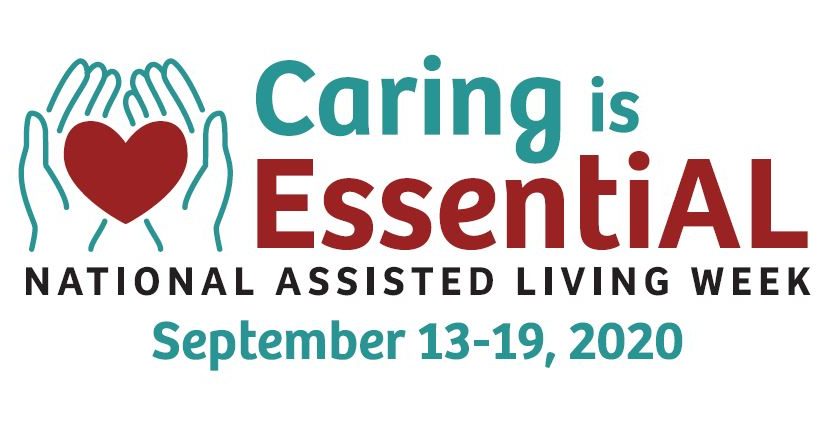Personal Protective Equipment (PPE) is now largely available for purchase. SNFs are expected to be using PPE at conventional capacity. AHCA/NCAL has developed a “PPE Action Brief” for facilities to print out, review, and take action today to ensure compliance.
Tag: Gero Nurse Prep
National Assisted Living Week Theme Revealed for September Celebration
The National Center for Assisted Living (NCAL) said “Compassion, Community, Caring” is this year’s theme for National Assisted Living Week®. The annual, national observance—officially sponsored by First Quality in 2021—provides a unique opportunity for residents, their loved ones, staff, volunteers, and local communities to celebrate the individuals who live and work in assisted living and learn more about this sector of long term care.
“This year’s National Assisted Living Week is special because of everything we have faced over the past year,” said NCAL Executive Director Scott Tittle. “’Compassion, Community, Caring’ reflects the hard work and dedication of all the essential caregivers in assisted living communities during the COVID-19 pandemic. It also represents the importance of family and remaining connected, even when we could not physically be together.”
Established by NCAL in 1995, National Assisted Living Week (NALW) will be held Sept. 12-18. “Compassion, Community, Caring” encourages assisted living communities around the country to host a variety of events that honor the individuals who reside, work, and volunteer in these communities while adhering to infection control requirements and precautions in place for COVID-19.
“First Quality is honored to be the official sponsor of National Assisted Living Week in 2021,” said Shelley Bache, First Quality Healthcare Leader. “After one of the most challenging years ever, it is imperative to remember and celebrate those in assisted living communities who did so much in the midst of so many unknowns. This week is a time to come together in a safe way and recognize the ‘Compassion, Community, Caring’ that could not be stopped by a pandemic.”
In the coming months, NCAL said it will issue a planning guide and products centered on ways to celebrate the week’s theme. Participants are asked to share their celebrations throughout the week on social media with the hashtag #NALW.
Visit www.ahcancal.org/NALW for updated information and resources.
Take Advantage of the May Sale on AHCA/NCAL’s Premier Gerontological Nurse Training!
- Significantly higher average SNF Value Based Purchasing scores (44.17 versus 34.42 for the nation). Higher SNF VBP Score = Higher Medicare Part A reimbursement rates.
- Two fewer deficiencies on average (5.71 citations versus the 7.55 national average in last cycle)
- Fewer Immediate Jeopardy (IJ) citations (1.60 versus the 2.27 national average)
- More stars — nearly twice as likely to be a CMS 5-Star facility (50% versus the 28% national average)
- Significantly lower re-hospitalization rates over the previous six years
- Significantly lower rates of off-label use of antipsychotics over the previous five years
CMS Updates Guidance for Emergency Preparedness Regulations
How COVID-19 Has Changed Telemedicine
In its first ever digital issue, Provider reports on how COVID-19 has changed the supply and demand of telehealth services in long term and post-acute care. Read more here. [mmsend85.com]
It’s National Assisted Living Week
Established by the National Center for Assisted Living (NCAL) in 1995, National Assisted Living Week® provides a unique opportunity for residents, their loved ones, staff, volunteers, and the surrounding communities to recognize the role of assisted living in caring for America’s seniors and individuals with disabilities. The annual observance encourages assisted living communities around the country to offer a variety of events and activities to celebrate the individuals they serve, as well as to help educate members of the public about this distinctive aspect of long term care.
Find out more by going to https://www.ahcancal.org/Education-Events/Pages/NALW.aspx
FAQs: Nursing Home Testing Requirements
Frequently asked questions and quick links to COVID-19 testing requirements for nursing homes brought to you by AHCA/NCAL.
Providers and Pressure Injuries
Join RN HUDDLE for a new series with the National Pressure Injury Advisory Panel. In this episode, we welcome back Renee Paulin, MSN, RN, CWOCN, as she joins a member of the NPIAP Board of Directors and Chair of the NPIAP Education Committee, Dr. Lee Ruotsi. Renee and Dr. Ruotsi discuss the essential responsibility all providers and clinicians have to combat pressure injuries. Keep an eye out for future episodes with others from NPIAP.
Learn more about the National Pressure Advisory Panel by going to https://npiap.com/
Targeted COVID-19 Training for Nursing Homes.
Nursing home providers can now participate in an “unprecedented” infection control training program designed to help them better manage COVID-19 in their facilities.
The Centers for Medicare & Medicaid Services released details about the program Tuesday. The program was originally announced in late July as part of an additional $5 billion in coronavirus relief funding for nursing homes.
The program, which is available immediately to all Medicare- and Medicaid-certified nursing homes, is a tailored course that incorporates the most recent lessons learned by nursing homes during the ongoing pandemic. It also features best practices that frontline workers can implement to fight COVID-19 in their facilities, CMS Administrator Seema Verma explained during a press call Tuesday.
Read more at https://bit.ly/3llaby5
For more information or to register https://qsep.cms.gov/COVID-Training-Instructions.aspx









